吉林省镇赉县蒙古族中学校人教版九年级英语全册Unit10 Section_B课件 (共51张PPT)
文档属性
| 名称 | 吉林省镇赉县蒙古族中学校人教版九年级英语全册Unit10 Section_B课件 (共51张PPT) |
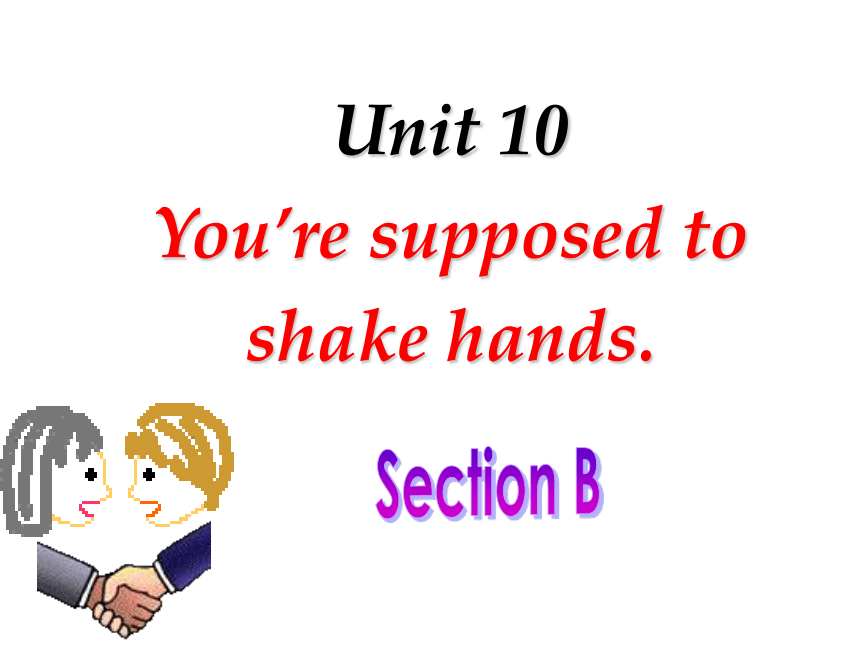
|
|
| 格式 | zip | ||
| 文件大小 | 1.3MB | ||
| 资源类型 | 教案 | ||
| 版本资源 | 人教新目标(Go for it)版 | ||
| 科目 | 英语 | ||
| 更新时间 | 2017-12-17 00:00:00 | ||
图片预览

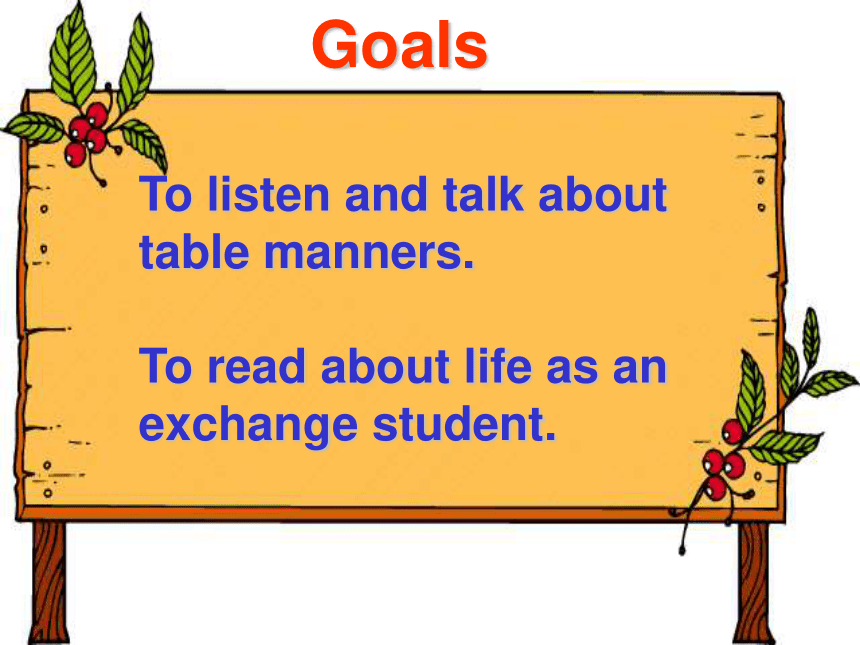
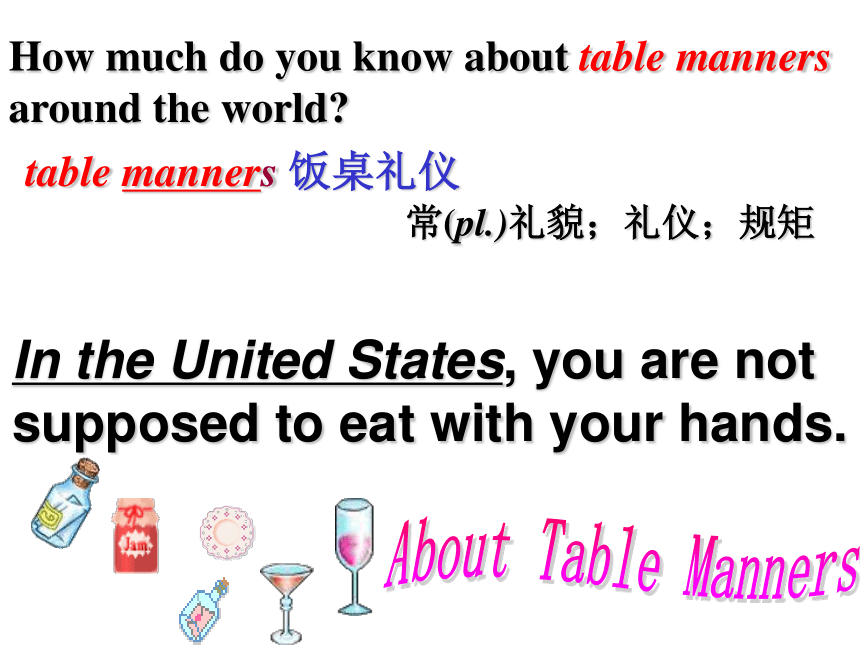
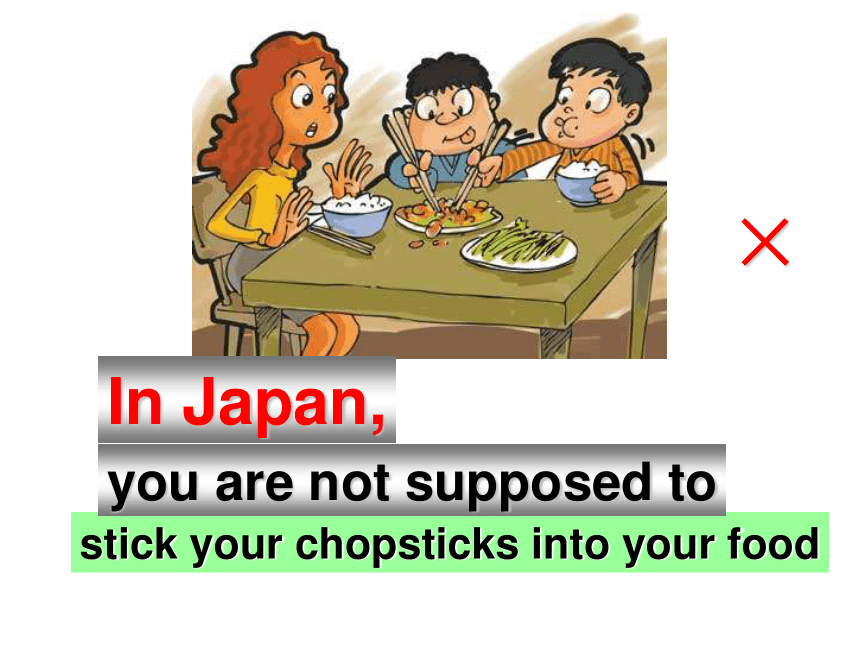
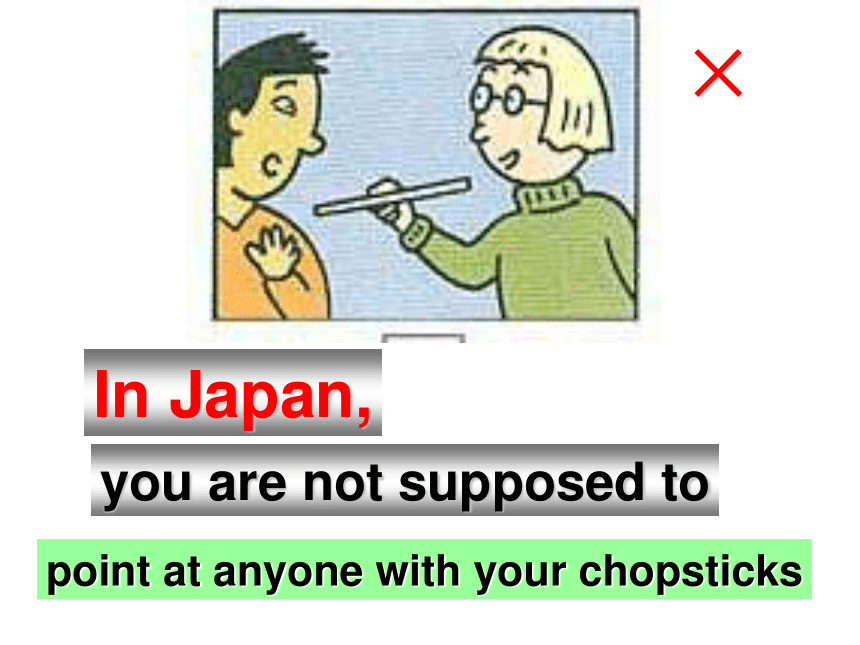
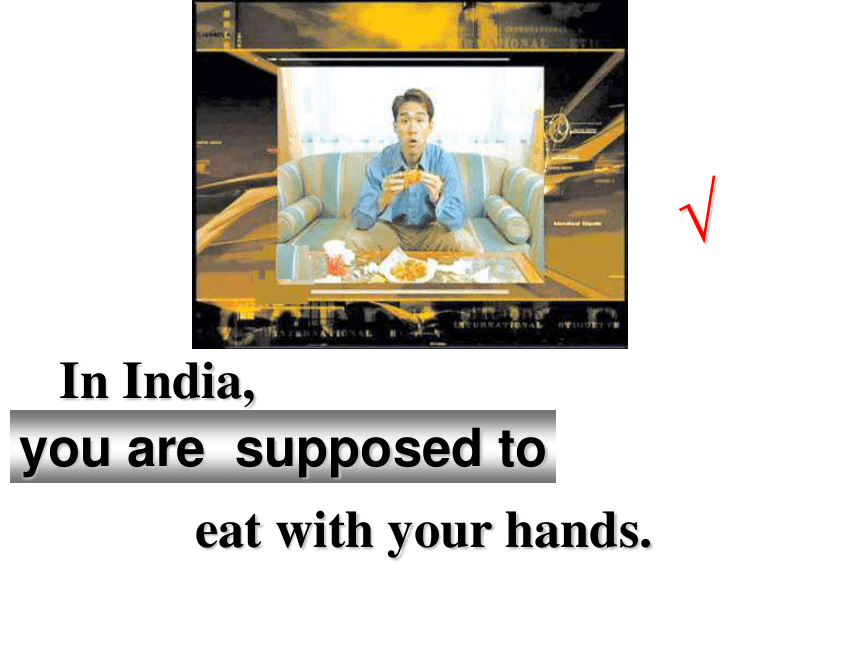
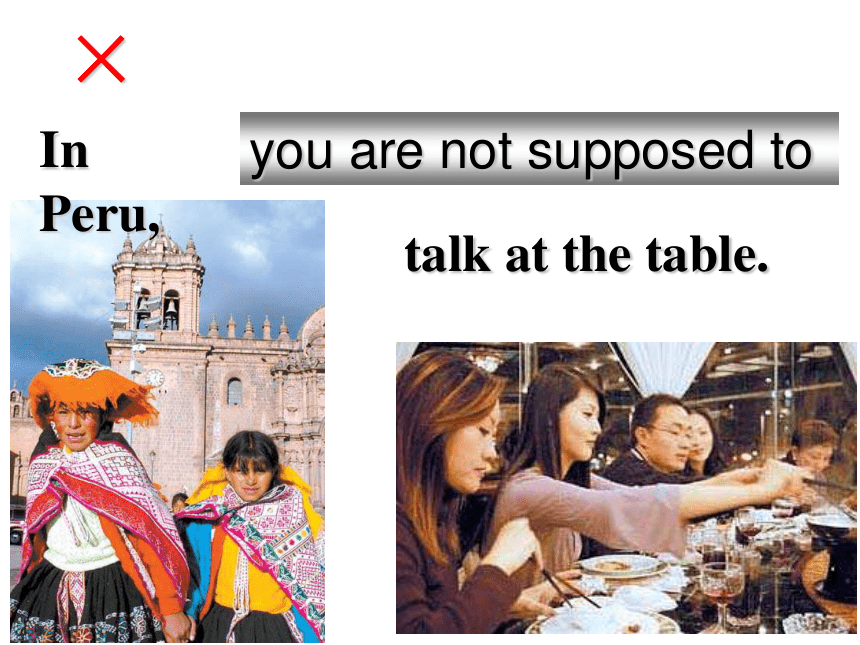
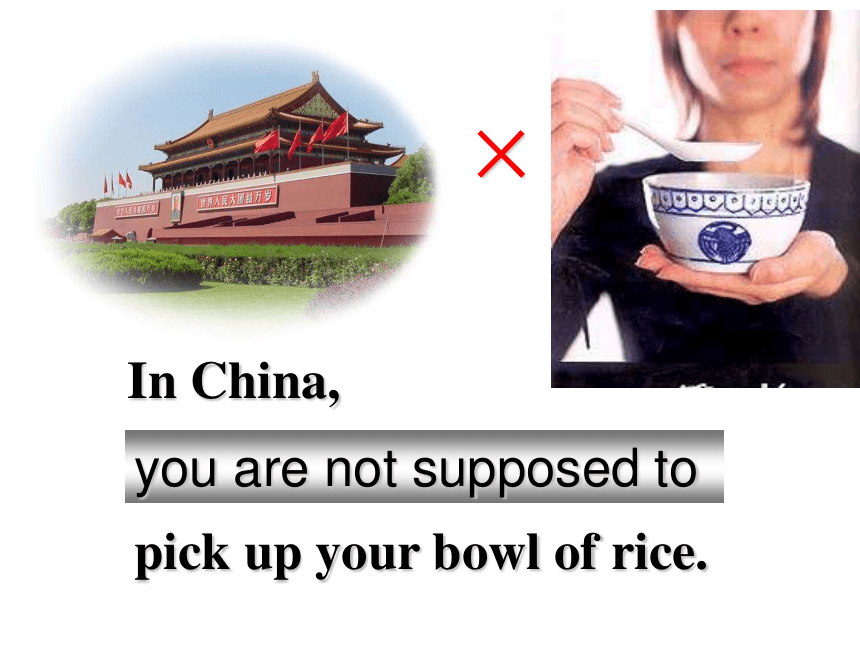
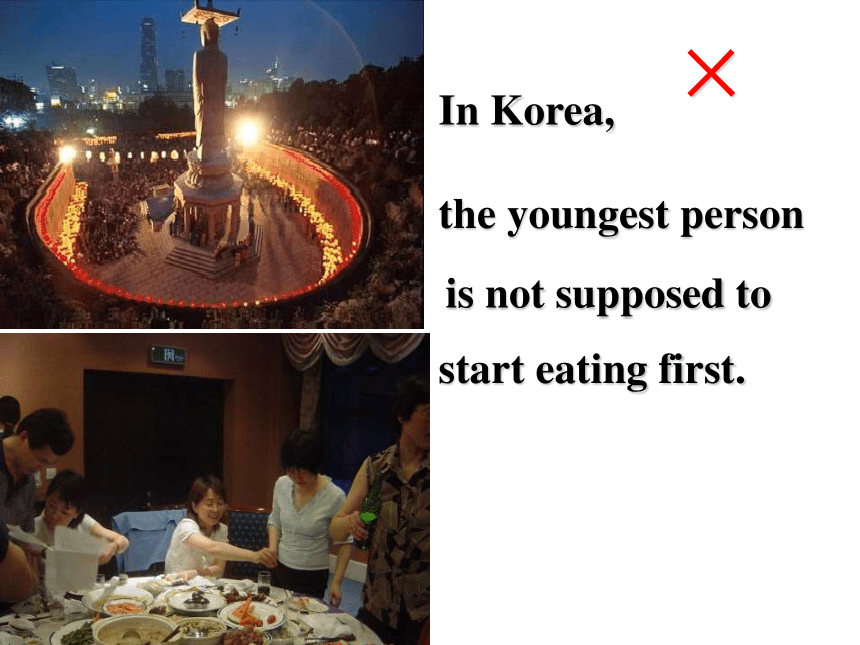
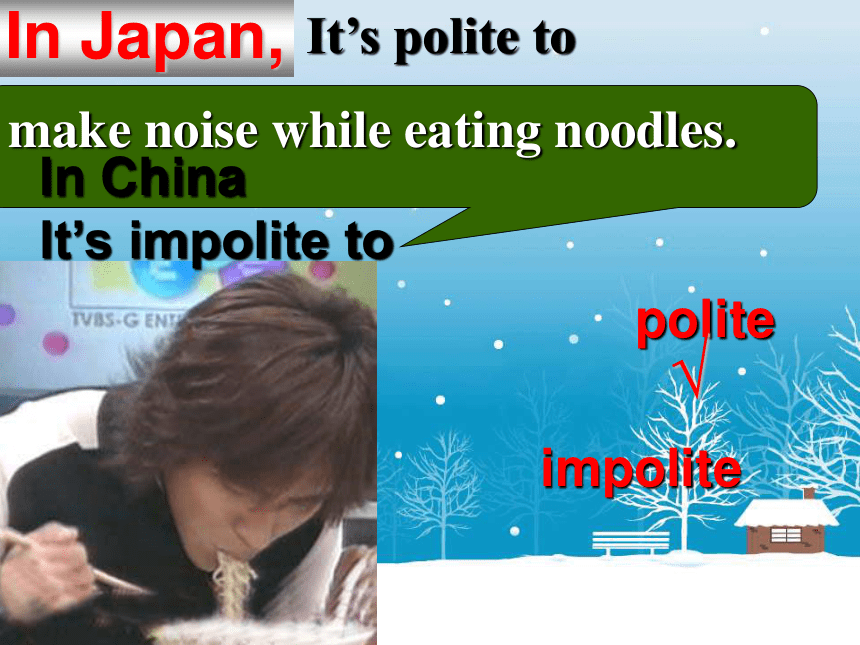
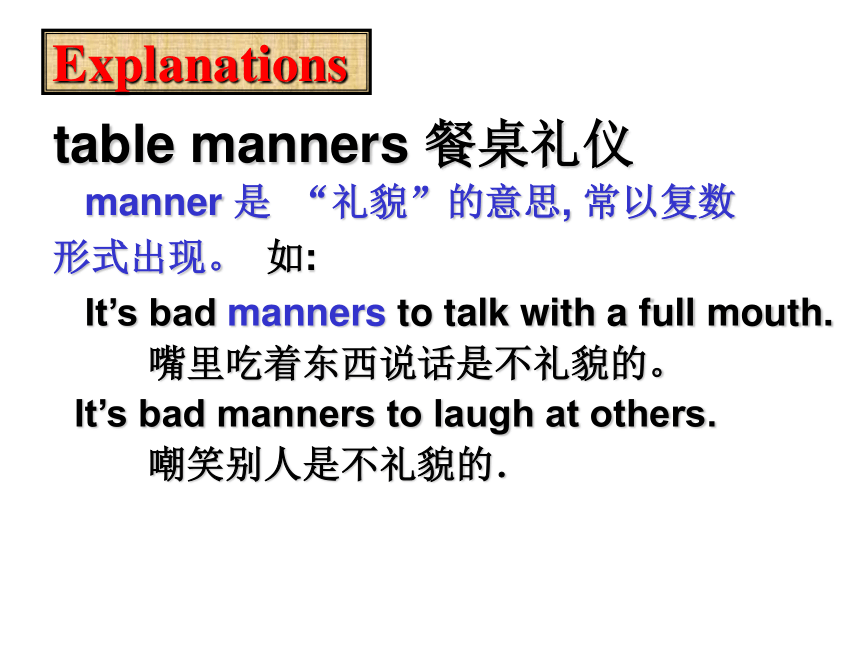
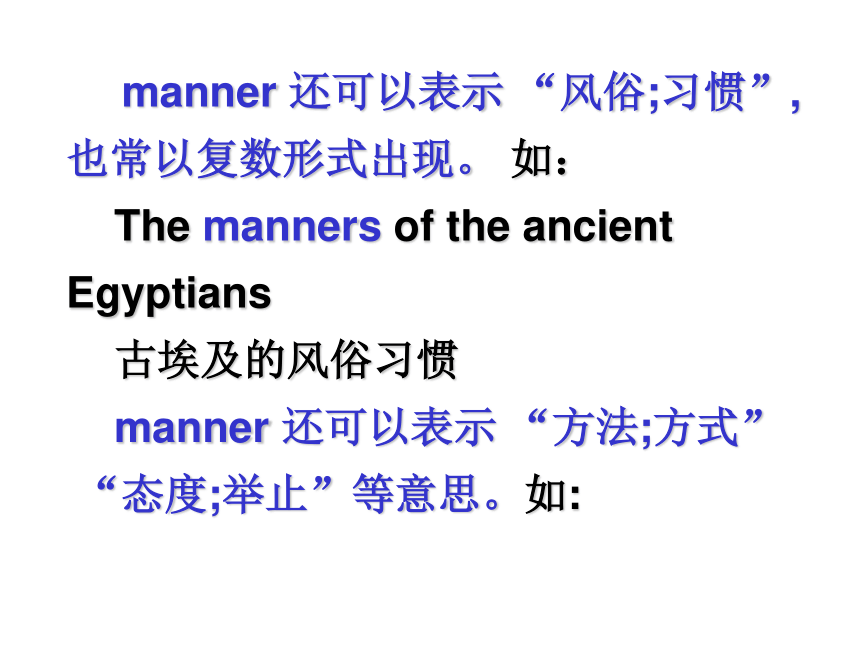
文档简介
课件51张PPT。Unit 10
You’re supposed to shake hands.Section BGoalsTo listen and talk about
table manners.
To read about life as an
exchange student.In the United States, you are not supposed to eat with your hands. table manners 饭桌礼仪How much do you know about table manners around the world?About Table Manners常(pl.)礼貌;礼仪;规矩In Japan,stick your chopsticks into your food×you are not supposed toIn Japan,point at anyone with your chopsticks×you are not supposed toeat with your hands.you are supposed toIn India, √In Peru, talk at the table.×you are not supposed to×you are not supposed toIn China,pick up your bowl of rice.the youngest person
start eating first.is not supposed toIn Korea,× make noise while eating noodles. In Japan,It’s polite topoliteimpoliteIn China
It’s impolite to√table manners 餐桌礼仪
manner 是 “礼貌”的意思, 常以复数
形式出现。 如:
It’s bad manners to talk with a full mouth.
嘴里吃着东西说话是不礼貌的。
It’s bad manners to laugh at others.
嘲笑别人是不礼貌的.Explanations manner 还可以表示 “风俗;习惯”,
也常以复数形式出现。 如:
The manners of the ancient Egyptians
古埃及的风俗习惯
manner 还可以表示 “方法;方式”
“态度;举止”等意思。如: Don’t you think that David has got a very arrogant manner?
你难道不觉得戴维的态度很傲慢吗?
Why are you talking in such a strange manner?
你为什么用这种奇怪的方式谈话。1. In china ,you’re not supposed
to pick up your bowl of rice.
在中国,你不应该端起你的饭碗。
pick up, “捡起;拾起;拿起” 还有(车辆)中途搭人或带物的意思。Explanations 如:
A girl picked up a wallet on her way home.
一个小女孩在回家的路上捡到了一个钱包。
The phone stopped ringing just as I picked up the receiver.
我一拿起听筒, 电话就不响了。
My car will pick you up this afternoon.
我的车下午来接你.3. to stick your chopsticks into your food。
把筷子插入你的食物中。
(1)stick 动词, “刺, 插入” 如:
Stick a fork into the meat to see if it’s
ready.
将叉插进肉里看熟了没有。 I can’t move. There’s a piece of wire
sticking in my leg.
我动不了啦,有一根金属丝刺进我的腿
里了。
(2)chopstick 是由 “chop(砍)+stick(棍子)组成的合成词。意思是 “筷子” 它通常以复数形式出现。如:
Our Chinese always use chopsticks to eat, but the English don’t use them.
我们中国人通常用筷子吃饭, 而英国人不。4. It’s rude to point at anyone with
your chopsticks.
用你的筷子指着别人是很不礼貌的。
常用词组be rude to sb, 意思是 “对某
人无理”。 It’s rude to interrupt when people are speaking.
打断人家的话是不礼貌的。
I think it was rude of them not to phone and say that they weren’t coming.
他们来不了,也不打电话通知一声, 太
不象话了。 point 是一个动词,意思是 “指, 指向”。
它构成的词组” “point at/to sb/sth”意思是 “指
向” “对准”。 如:
“I’ll have that one.” She said, pointing
at a big chocolate cake.
“我想要这个。”她指着一块大的巧克
力蛋糕说。
Don’t point at me! 别指着我!e.g. My cousin went to America, and she said that learning basic table manners was her biggest challenge. She never knew what she was supposed to do at the dinner table.宾语从句1.与主句的时态保持一致
2.使用陈述句语序She asked me if I knew ______.
A. whose pen was it
B. whose pen it was
C. whose pen it is
D. whose pen is itBspeak讲语言 speak to sb about sth
tell告诉 tell sb sth/tell sth to sb
say说 say sth to sb
talk交谈,聊天 talk to sb/talk sb about sth say 一般作vt,着重说话的内容,它的宾语可以是名词,代词或宾语从句。 eg: He can say his name.
他会说他的名字。
Please say it in English.
请用英语用。 say ,speak, talk 和tell辨析speak强调说的动作,不强调所说的内容 。
vt,常以某种 语言作宾语。vi,常见的搭配形式有: speak of something/somebody谈到某事(某人)speak to sb 跟某 人讲话,此外speak还可用于在较为正式的场合了表演讲或演说。 Can you speak Japanese? 你会说日语吗?
She is speaking to her teacher.
她正在跟她的老师说话。 talk 一般为vi,意思是“交谈,谈话,着重强调两具之间的相互说话。
。 eg: She is talking with Lucy in English. 她正在和露茜用英语交谈。
What are you talking about?
你们在谈论什么?
The teacher is talking to him.
老师正在和他谈话tell常作vt,意为“讲述,告诉,动词常跟双宾语。
tell sb sth=tell sth to sb告诉某人某事。 eg: He is telling the children a story.
他正在给孩子们讲一个故事。
Did you tell her the news?
=Did you tell the news to her?
你把这个消息告诉她了吗?
REVIEWING
Taking notes or summarizing the main ideas can help you move language from your short-term to long-term memory.复习
做笔记或总结主要观点可以帮助你将语言的短期记忆变成长期记忆。Dear Laura,
Thanks for your message. Yes, I’m having a great
time on my student exchange program in France. I was a bit nervous before I arrived here but there was no reason to be. My host family is really nice. Th ey go out of their way to make me feel at home. The grandmother knows that I miss Chinese food a lot. So she actually learned how to make Chinese food! Did you have a great/wonderful/good/nice time last Sunday?=Did you have fun last Sunday?=Did you enjoy yourselves last Sunday?玩得高兴,过得愉快n. 交换 an exchangevt. Can I exchange an apple for four oranges?They go out of their way to make me feel at home. 他们尽力让我感觉自在。(1) go out of one’s way to do sth 竭尽全力/尽力做某事,想尽办法做某事 Rose 竭尽全力来帮助Tom学英语.Rose goes out of her way to help Tom with his English.(2) make...feel at home 使(某人)感觉在家(一样);感觉自在I’m doing everything I can to make them feel at home. 我在尽我一切所能使他们感到宾至如归。1)“make+宾语+n.:“使让某人 / 某物(成为)……”。如: We made him our monitor. 我们选他当班长。2)“make+宾语+adj.”: “使某人 / 某事(变得)……”。
We must make the rivers clean. 我们必须净化河水。3)“make+宾语+do sth.”(不带to的不定式)”意为 “使某人做某事”。
如: Our teacher makes us feel more confident. 老师使得我们感到更自信了。友情提示:在被动语态中,此类结构中省略的动词不定式 to 要还原。
如:The boy was made to work twelve hours a day. 这个男孩被迫每天干十二个小时的活。make+宾语+宾语补足语”句型:宾语补足语可以是不带to的不定式、过去分词、形容词或名词友情提示:当宾语是不定式短语或从句时,多用it作形式宾语。:The heavy rain made it impossible for us to go out. 大雨使得我们无法出去。4)“make+宾语+V-ed(过去分词作宾补)”:表示被动的意思,意为 “使某人 / 某事被……”。如:The strange noise made us frightened. 奇怪的声音使我们感到恐惧。友情提示:通常情况下,make后的宾语是反身代词时,作宾补的动词要用过去分词,即:make oneself+V-ed (heard, known, understood)。She also has a teenage granddaughter about my age. She’s really kind and she always talks to me in French to help me practice. You wouldn’t believe how quickly my French has improved because of that. I’m very comfortable speaking French now. Although I still make lots of mistakes, it doesn’t worry me like it used to. adj. 十几岁的;青少年的 n. teenager 青少年(1) although 虽然…但是,相当于though,引导让步状语从句,不能和but连用.They went on working although it began to rain.尽管我仍然犯很多错误,可它不像过去那样困扰我了。because 是连词,其后接句子;
because of 是介词短语,其后接名词、代词、动名词、what 从句等I didn’t buy it because it was too expensive.
我没有买是因为它太贵了。He is here because of you (that).
他为你(那事)而来这里。He lost his job because of his age.
由于年龄关系他失去了工作。
We said nothing about it, because of his wife’s being there.
因为他妻子在那儿,我们对此只字未提。
He knew she was crying because of what he had said. 他知道她哭是因为他说的话。
注:because of 之后可接 what 从句,但不能接 that 从句或没有引导词的句子。make a mistake / make lots of mistakes 犯错bother v. “打扰,烦扰”,bother about sth/ doing sth焦虑某事/麻烦;bother to do sth 麻烦做某事.考试中,他犯了许多错误.He made lots of mistakes in the exam.Explanations My biggest challenge is learning how to behave at the dinner table. As you can imagine, things are very different from the way they are at home. For example, you’re not supposed to put your bread on your plate. You’re supposed to put it on the table! I thought that
was pretty strange at first, but now I’m used to it. Another example is that you’re not supposed to eat anything with your hands except bread, not even fruit. 习惯我最大的挑战是学会餐桌上的礼仪。v.行为举止; 举止名词是behavior, 意思是 “行为”。与…不同”,其反义短语是be the same as… “与…相同”.The color of my coat is the same as yours.He is quite different from other boys. The students in Class2 behaved very well yesterday.
二班的学生昨天表现挺好。
The little boy behaved with great encourage in the face of gunman.
在持枪歹徒面前,这个小男孩表现得极有勇气。
它还可以表示 “守规矩;举止适当有礼”的意思。如:
Please behave yourself. 请礼貌点儿。
Will you children please behave!
你们这些孩子们能不能守规矩点 反behave badly I thought that was pretty strange at first, but now I’m used to it.起初,我觉得那种做法非常奇怪,但现在我习惯了.(1) at first 起初,首先1.首先,我们必须准备好一切.At first, we must get everything ready. 2.他做学生时,常常上学迟到.He used to be late for school when he was a student.(2) be used to…=get used to 习惯于…词组中的to 是介词, 其后如果跟动词 动词应该用动名词形式。 used to do 意为“过去常常做…”其后必须接动词不定式.e.g. The astronauts soon got used to the condition of weightlessness . 太空人很快就习惯了失重状态。I’m getting used to the school life here.
我开始习惯这里的学校生活。
She gets used to talking in English.
她习惯用英语交谈。
He will get used to getting up early.
他将习惯于早起。get/be used to 意思是 “习惯于…”You have to cut it up and eat it with a fork. Another thing is it’s impolite to say that you’re full. If you don’t want any more food, you should just say, “Th at was delicious.” Also, you’re not supposed to put your elbows on the table. I have to say that I find it difficult to remember everything, but I’m gradually getting used to it. I don’t find French customs so strange anymore. 不得不承认,我发现记住一切东西是很困难的,但我渐渐习惯了,并且发现他们也不再那么奇怪了。
逐渐地prep. “用”的意思,常表示“用(某种工具)”,而in也有“用”的意思,常表示“用(语言或材料等)”.n. 肘;肘部I’ll write again soon and tell you more about my life in France. Hope you’re having a good school year.
Yours,
Wang Kun1. 我们用钢笔写字.We write with a pen.2.他喜欢用红墨水写字.He likes to write in red ink.3.除了星期六和星期日,我们每天去上学.We go to school except Saturday and Sunday.4.除了汤姆成功以外,我们也都成功了.We all succeeded besides Tom. except prep.意为“除…之外”表示把某一个体从整体中排除在外. besides prep.但意为“除…以外还有”常表示包括被除去的对象在内.I find it difficult to remember everything. 我发现很难记住所有事情。该句结构为“主语find it adj to do sth”,意为“发现做某事怎么样”.其中“it”是形式宾语,adj.是宾语补足语,to do sth是真正的宾语.带有形式宾语的常见动词有think, find, know, believe, feel 等.1)We find it easy to learn swimming.2) Teenagers find it interesting to play computer games.1)我们发现学游泳容易.2)年轻人发现玩电脑游戏非常有趣.3)我们认为遵守法律十分重要.3)We think it important to obey the laws.9. …but I’m gradually getting used to things, and don’t find them so strange any more. 但我逐渐习惯了这些事情,不再觉得它们很奇怪了。not…any more = no more 不再,常指某一动作不再发生.not… any longer =no longer 不再,多指某动作或状态不再继续.1.我们不再是孩子了.We are no longer children./ We are not children any longer.2.他再也不会这样做了.He will no more do so./ He will not do so any more.I’ll write again soon and tell you more about my life in France. Hope you’re having a good school year.
Yours,
Wang Kun1. It’s even better than I thought it would be.
事情比我原来想象的还好。(1) even better 更加好 even是程度副词,意为“甚至,更”.用来修饰比较级.此外, much, a lot, a little, far等副词也可用作比较级的修饰语.1.他比我高得多.He is much taller than I.2. 他比以前懒一些.He is a little lazier than before.Explanations You're supposed to write quickly!Cooperative learning合作学习两个大脑通常比一个大脑思考的又快又好.和某人一起工作,这样具有创造力学得也较好,且通过他们也可得到灵感,共享你的观点.e-mail English is a new kind of written English that is being used to save time. meaning abbreviations 缩写词
homophone 同音字
emoticons由字符组成的图释e-mail English types3apunctuation marks 标点符号
You’re supposed to shake hands.Section BGoalsTo listen and talk about
table manners.
To read about life as an
exchange student.In the United States, you are not supposed to eat with your hands. table manners 饭桌礼仪How much do you know about table manners around the world?About Table Manners常(pl.)礼貌;礼仪;规矩In Japan,stick your chopsticks into your food×you are not supposed toIn Japan,point at anyone with your chopsticks×you are not supposed toeat with your hands.you are supposed toIn India, √In Peru, talk at the table.×you are not supposed to×you are not supposed toIn China,pick up your bowl of rice.the youngest person
start eating first.is not supposed toIn Korea,× make noise while eating noodles. In Japan,It’s polite topoliteimpoliteIn China
It’s impolite to√table manners 餐桌礼仪
manner 是 “礼貌”的意思, 常以复数
形式出现。 如:
It’s bad manners to talk with a full mouth.
嘴里吃着东西说话是不礼貌的。
It’s bad manners to laugh at others.
嘲笑别人是不礼貌的.Explanations manner 还可以表示 “风俗;习惯”,
也常以复数形式出现。 如:
The manners of the ancient Egyptians
古埃及的风俗习惯
manner 还可以表示 “方法;方式”
“态度;举止”等意思。如: Don’t you think that David has got a very arrogant manner?
你难道不觉得戴维的态度很傲慢吗?
Why are you talking in such a strange manner?
你为什么用这种奇怪的方式谈话。1. In china ,you’re not supposed
to pick up your bowl of rice.
在中国,你不应该端起你的饭碗。
pick up, “捡起;拾起;拿起” 还有(车辆)中途搭人或带物的意思。Explanations 如:
A girl picked up a wallet on her way home.
一个小女孩在回家的路上捡到了一个钱包。
The phone stopped ringing just as I picked up the receiver.
我一拿起听筒, 电话就不响了。
My car will pick you up this afternoon.
我的车下午来接你.3. to stick your chopsticks into your food。
把筷子插入你的食物中。
(1)stick 动词, “刺, 插入” 如:
Stick a fork into the meat to see if it’s
ready.
将叉插进肉里看熟了没有。 I can’t move. There’s a piece of wire
sticking in my leg.
我动不了啦,有一根金属丝刺进我的腿
里了。
(2)chopstick 是由 “chop(砍)+stick(棍子)组成的合成词。意思是 “筷子” 它通常以复数形式出现。如:
Our Chinese always use chopsticks to eat, but the English don’t use them.
我们中国人通常用筷子吃饭, 而英国人不。4. It’s rude to point at anyone with
your chopsticks.
用你的筷子指着别人是很不礼貌的。
常用词组be rude to sb, 意思是 “对某
人无理”。 It’s rude to interrupt when people are speaking.
打断人家的话是不礼貌的。
I think it was rude of them not to phone and say that they weren’t coming.
他们来不了,也不打电话通知一声, 太
不象话了。 point 是一个动词,意思是 “指, 指向”。
它构成的词组” “point at/to sb/sth”意思是 “指
向” “对准”。 如:
“I’ll have that one.” She said, pointing
at a big chocolate cake.
“我想要这个。”她指着一块大的巧克
力蛋糕说。
Don’t point at me! 别指着我!e.g. My cousin went to America, and she said that learning basic table manners was her biggest challenge. She never knew what she was supposed to do at the dinner table.宾语从句1.与主句的时态保持一致
2.使用陈述句语序She asked me if I knew ______.
A. whose pen was it
B. whose pen it was
C. whose pen it is
D. whose pen is itBspeak讲语言 speak to sb about sth
tell告诉 tell sb sth/tell sth to sb
say说 say sth to sb
talk交谈,聊天 talk to sb/talk sb about sth say 一般作vt,着重说话的内容,它的宾语可以是名词,代词或宾语从句。 eg: He can say his name.
他会说他的名字。
Please say it in English.
请用英语用。 say ,speak, talk 和tell辨析speak强调说的动作,不强调所说的内容 。
vt,常以某种 语言作宾语。vi,常见的搭配形式有: speak of something/somebody谈到某事(某人)speak to sb 跟某 人讲话,此外speak还可用于在较为正式的场合了表演讲或演说。 Can you speak Japanese? 你会说日语吗?
She is speaking to her teacher.
她正在跟她的老师说话。 talk 一般为vi,意思是“交谈,谈话,着重强调两具之间的相互说话。
。 eg: She is talking with Lucy in English. 她正在和露茜用英语交谈。
What are you talking about?
你们在谈论什么?
The teacher is talking to him.
老师正在和他谈话tell常作vt,意为“讲述,告诉,动词常跟双宾语。
tell sb sth=tell sth to sb告诉某人某事。 eg: He is telling the children a story.
他正在给孩子们讲一个故事。
Did you tell her the news?
=Did you tell the news to her?
你把这个消息告诉她了吗?
REVIEWING
Taking notes or summarizing the main ideas can help you move language from your short-term to long-term memory.复习
做笔记或总结主要观点可以帮助你将语言的短期记忆变成长期记忆。Dear Laura,
Thanks for your message. Yes, I’m having a great
time on my student exchange program in France. I was a bit nervous before I arrived here but there was no reason to be. My host family is really nice. Th ey go out of their way to make me feel at home. The grandmother knows that I miss Chinese food a lot. So she actually learned how to make Chinese food! Did you have a great/wonderful/good/nice time last Sunday?=Did you have fun last Sunday?=Did you enjoy yourselves last Sunday?玩得高兴,过得愉快n. 交换 an exchangevt. Can I exchange an apple for four oranges?They go out of their way to make me feel at home. 他们尽力让我感觉自在。(1) go out of one’s way to do sth 竭尽全力/尽力做某事,想尽办法做某事 Rose 竭尽全力来帮助Tom学英语.Rose goes out of her way to help Tom with his English.(2) make...feel at home 使(某人)感觉在家(一样);感觉自在I’m doing everything I can to make them feel at home. 我在尽我一切所能使他们感到宾至如归。1)“make+宾语+n.:“使让某人 / 某物(成为)……”。如: We made him our monitor. 我们选他当班长。2)“make+宾语+adj.”: “使某人 / 某事(变得)……”。
We must make the rivers clean. 我们必须净化河水。3)“make+宾语+do sth.”(不带to的不定式)”意为 “使某人做某事”。
如: Our teacher makes us feel more confident. 老师使得我们感到更自信了。友情提示:在被动语态中,此类结构中省略的动词不定式 to 要还原。
如:The boy was made to work twelve hours a day. 这个男孩被迫每天干十二个小时的活。make+宾语+宾语补足语”句型:宾语补足语可以是不带to的不定式、过去分词、形容词或名词友情提示:当宾语是不定式短语或从句时,多用it作形式宾语。:The heavy rain made it impossible for us to go out. 大雨使得我们无法出去。4)“make+宾语+V-ed(过去分词作宾补)”:表示被动的意思,意为 “使某人 / 某事被……”。如:The strange noise made us frightened. 奇怪的声音使我们感到恐惧。友情提示:通常情况下,make后的宾语是反身代词时,作宾补的动词要用过去分词,即:make oneself+V-ed (heard, known, understood)。She also has a teenage granddaughter about my age. She’s really kind and she always talks to me in French to help me practice. You wouldn’t believe how quickly my French has improved because of that. I’m very comfortable speaking French now. Although I still make lots of mistakes, it doesn’t worry me like it used to. adj. 十几岁的;青少年的 n. teenager 青少年(1) although 虽然…但是,相当于though,引导让步状语从句,不能和but连用.They went on working although it began to rain.尽管我仍然犯很多错误,可它不像过去那样困扰我了。because 是连词,其后接句子;
because of 是介词短语,其后接名词、代词、动名词、what 从句等I didn’t buy it because it was too expensive.
我没有买是因为它太贵了。He is here because of you (that).
他为你(那事)而来这里。He lost his job because of his age.
由于年龄关系他失去了工作。
We said nothing about it, because of his wife’s being there.
因为他妻子在那儿,我们对此只字未提。
He knew she was crying because of what he had said. 他知道她哭是因为他说的话。
注:because of 之后可接 what 从句,但不能接 that 从句或没有引导词的句子。make a mistake / make lots of mistakes 犯错bother v. “打扰,烦扰”,bother about sth/ doing sth焦虑某事/麻烦;bother to do sth 麻烦做某事.考试中,他犯了许多错误.He made lots of mistakes in the exam.Explanations My biggest challenge is learning how to behave at the dinner table. As you can imagine, things are very different from the way they are at home. For example, you’re not supposed to put your bread on your plate. You’re supposed to put it on the table! I thought that
was pretty strange at first, but now I’m used to it. Another example is that you’re not supposed to eat anything with your hands except bread, not even fruit. 习惯我最大的挑战是学会餐桌上的礼仪。v.行为举止; 举止名词是behavior, 意思是 “行为”。与…不同”,其反义短语是be the same as… “与…相同”.The color of my coat is the same as yours.He is quite different from other boys. The students in Class2 behaved very well yesterday.
二班的学生昨天表现挺好。
The little boy behaved with great encourage in the face of gunman.
在持枪歹徒面前,这个小男孩表现得极有勇气。
它还可以表示 “守规矩;举止适当有礼”的意思。如:
Please behave yourself. 请礼貌点儿。
Will you children please behave!
你们这些孩子们能不能守规矩点 反behave badly I thought that was pretty strange at first, but now I’m used to it.起初,我觉得那种做法非常奇怪,但现在我习惯了.(1) at first 起初,首先1.首先,我们必须准备好一切.At first, we must get everything ready. 2.他做学生时,常常上学迟到.He used to be late for school when he was a student.(2) be used to…=get used to 习惯于…词组中的to 是介词, 其后如果跟动词 动词应该用动名词形式。 used to do 意为“过去常常做…”其后必须接动词不定式.e.g. The astronauts soon got used to the condition of weightlessness . 太空人很快就习惯了失重状态。I’m getting used to the school life here.
我开始习惯这里的学校生活。
She gets used to talking in English.
她习惯用英语交谈。
He will get used to getting up early.
他将习惯于早起。get/be used to 意思是 “习惯于…”You have to cut it up and eat it with a fork. Another thing is it’s impolite to say that you’re full. If you don’t want any more food, you should just say, “Th at was delicious.” Also, you’re not supposed to put your elbows on the table. I have to say that I find it difficult to remember everything, but I’m gradually getting used to it. I don’t find French customs so strange anymore. 不得不承认,我发现记住一切东西是很困难的,但我渐渐习惯了,并且发现他们也不再那么奇怪了。
逐渐地prep. “用”的意思,常表示“用(某种工具)”,而in也有“用”的意思,常表示“用(语言或材料等)”.n. 肘;肘部I’ll write again soon and tell you more about my life in France. Hope you’re having a good school year.
Yours,
Wang Kun1. 我们用钢笔写字.We write with a pen.2.他喜欢用红墨水写字.He likes to write in red ink.3.除了星期六和星期日,我们每天去上学.We go to school except Saturday and Sunday.4.除了汤姆成功以外,我们也都成功了.We all succeeded besides Tom. except prep.意为“除…之外”表示把某一个体从整体中排除在外. besides prep.但意为“除…以外还有”常表示包括被除去的对象在内.I find it difficult to remember everything. 我发现很难记住所有事情。该句结构为“主语find it adj to do sth”,意为“发现做某事怎么样”.其中“it”是形式宾语,adj.是宾语补足语,to do sth是真正的宾语.带有形式宾语的常见动词有think, find, know, believe, feel 等.1)We find it easy to learn swimming.2) Teenagers find it interesting to play computer games.1)我们发现学游泳容易.2)年轻人发现玩电脑游戏非常有趣.3)我们认为遵守法律十分重要.3)We think it important to obey the laws.9. …but I’m gradually getting used to things, and don’t find them so strange any more. 但我逐渐习惯了这些事情,不再觉得它们很奇怪了。not…any more = no more 不再,常指某一动作不再发生.not… any longer =no longer 不再,多指某动作或状态不再继续.1.我们不再是孩子了.We are no longer children./ We are not children any longer.2.他再也不会这样做了.He will no more do so./ He will not do so any more.I’ll write again soon and tell you more about my life in France. Hope you’re having a good school year.
Yours,
Wang Kun1. It’s even better than I thought it would be.
事情比我原来想象的还好。(1) even better 更加好 even是程度副词,意为“甚至,更”.用来修饰比较级.此外, much, a lot, a little, far等副词也可用作比较级的修饰语.1.他比我高得多.He is much taller than I.2. 他比以前懒一些.He is a little lazier than before.Explanations You're supposed to write quickly!Cooperative learning合作学习两个大脑通常比一个大脑思考的又快又好.和某人一起工作,这样具有创造力学得也较好,且通过他们也可得到灵感,共享你的观点.e-mail English is a new kind of written English that is being used to save time. meaning abbreviations 缩写词
homophone 同音字
emoticons由字符组成的图释e-mail English types3apunctuation marks 标点符号
同课章节目录
- Unit 1 How can we become good learners.
- Section A
- Section B
- Unit 2 I think that mooncakes are delicious!
- Section A
- Section B
- Unit 3 Could you please tell me where the restroom
- Section A
- Section B
- Unit 4 I used to be afraid of the dark.
- Section A
- Section B
- Unit 5 What are the shirts made of?
- Section A
- Section B
- Review of Units 1-5
- Unit 6 When was it invented?
- Section A
- Section B
- Unit 7 Teenagers should be allowed to choose their
- Section A
- Section B
- Unit 8 It must belong to Carla.
- Section A
- Section B
- Unit 9 I like music that I can dance to.
- Section A
- Section B
- Unit 10 You're supposed to shake hands.
- Section A
- Section B
- Review of Units 6-10
- Unit 11 Sad movies make me cry.
- Section A
- Section B
- Unit 12 Life is full of the unexpected
- Section A
- Section B
- Unit 13 We're trying to save the earth!
- Section A
- Section B
- Unit 14 I remember meeting all of you in Grade 7.
- Section A
- Section B
- Review of Units 11-14
